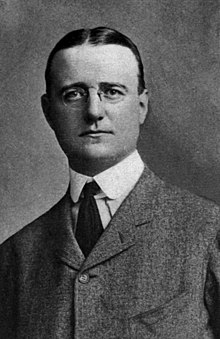Finley Dunne
| Finley Peter Dunne | |
|---|---|

Finley Peter Dunne
|
|
| Born |
Peter Dunne July 10, 1867 Chicago, Illinois, United States |
| Died | April 24, 1936 (aged 68) New York City, New York, United States |
| Occupation | Journalist |
| Spouse(s) | Margaret Ives Abbott |
Finley Peter Dunne (July 10, 1867 – April 24, 1936) was an American humorist and writer from Chicago. In 1898 Dunne published Mr. Dooley in Peace and in War, a collection of his nationally syndicated Mr. Dooley sketches. Speaking with the thick verbiage and accent of an Irish immigrant from County Roscommon, the fictional Mr. Dooley expounded upon political and social issues of the day from his South Side Chicago Irish pub. Dunne's sly humor and political acumen won the support of President Theodore Roosevelt, a frequent target of Mr. Dooley's barbs. Dunne's sketches became so popular and such a litmus test of public opinion that they were read each week at White House cabinet meetings.
Peter Dunne (he added the first name Finley later) was born in Chicago on July 10, 1867, to a carpenter also named Peter Dunne and his wife, the former Ellen Finley, both born in Ireland. Twin boys were born then, but brother John died in infancy. Peter was the fifth of the seven Dunne children who would survive to adulthood. Ellen Dunne was well-read, and created a bookish environment for her children. The Dunne family had many Catholic priests, and one such relative suggested the bright boy be trained as a clergymen, but the elder Peter Dunne refused, saying there would be no children forced to become priests in his family. Recognizing Peter's potential, his parents sent him to high school, the only Dunne boy to attend. His mother had become ill with tuberculosis as young Peter finished grade school, and she died while he was at West Division High School. Likely due to his loss, Dunne finished last in his class, though he shone in the school's literary society and as a debater. Dunne had taken the college-track curriculum at West Division, but his poor grades scuttled any such plans. He found a job as office boy at the Chicago Telegram and started work there in 1884, just before his 17th birthday.
Through his relatives, and as a local boy, Dunne was thoroughly familiar with the local police courts and firehouses. When superiors realized he could write, he was promoted to reporter and sent to cover the police department. His writing talent became clear to newspaper rivals perusing the pages of the Telegram, and Chicago Daily News managing editor Harry Ten Eyck White lured him away in 1885 at an increase in salary. The Telegram barely made ends meet; the Daily News was by far the most successful newspaper in Chicago. Instead of longer editorials, White preferred pithy comments ranging from sentence to paragraph length, and gave Dunne training in this. Some of the elements of Dunne's experience at the Daily News may have resonated in his later Mr. Dooley pieces. Editor White, a humorist of local note and a racing fan, had invented a character, "the horse reporter", who dispenses earthy wisdom to a Chicago newsroom's visitors, and had written a series of sketches about an Irish family living on Archer Avenue, Dooley's future home. On the Daily News staff was Eugene Field, a humorist and easily the best-paid journalist in Chicago from the 1880s until his 1895 death. Field's work tended to be noncontroversial, contrasting with the Dooley pieces, but Field's success proved that newspaper humor could pay.
...
Wikipedia
